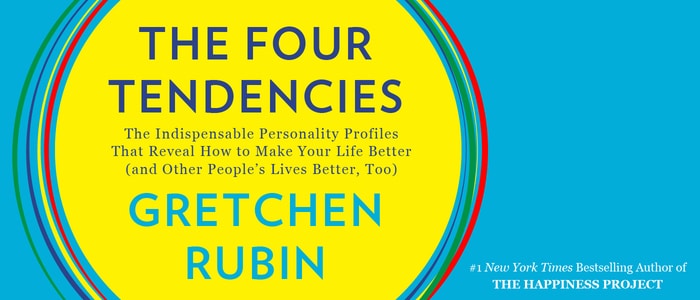Knowing Your “Tendency” Can Help You Accomplish Your 2018 Goals

Over the holiday break, I read Gretchen Rubin’s new book, The Four Tendencies. What I love about this book is that it provides valuable self-awareness about a very specific and important question: “How do I respond to expectations?”
If you have 10 minutes to take an online quiz that will help you identify your tendency, CLICK HERE. Otherwise, below is a description of how each type would respond to New Year’s resolutions.
Obligers:
Obligers often say, “I don’t make New Year’s resolutions anymore because I never manage to keep them—I never make time for myself.” They’re discouraged because they’ve tried and failed in the past.
The solution is easy: Create outer accountability. Want to read more? Join a book group. Want to exercise? Join a class, work out with a trainer, meet a friend who expects company, think of the duty to be a role model for other people…there are hundreds of ways to build outer accountability. And that’s what Obligers need. It’s not a matter of motivation, setting priorities, putting themselves first; they must have outer accountability to meet inner expectations.
Questioners:
Questioners are good at keeping resolutions that they set for themselves, but they usually start them whenever the time seems right. Often, they won’t wait for the New Year, because they object that “January 1 is just an arbitrary date. And it’s not efficient to wait to do something that I could start now.”
If Questioners struggle, it’s usually because they’re not convinced that this resolution is the best, most efficient way for them to meet their aim — or they don’t trust the judgment of the person encouraging them to make a change.
To do a better job of keeping a resolution, they should do their research, get clarity on why they’re pursuing a certain aim in a certain way, and reassure themselves that this approach makes the most sense. Questioners sometimes face “analysis-paralysis,” when they want perfect information before moving ahead. It’s helpful for them to remember, “At a certain point, it’s not efficient to keep researching. To get the benefit of my resolution, I need to get started without more delay.”
Rebels:
Rebels generally don’t bind themselves in advance, so a New Year’s resolution might not appeal to them. They want to do what they want, in their own way, in their own time — not because they promised themselves they’d do it.
On the other hand, some Rebels love the challenge of a New Year’s resolution: “My family thinks I can’t give up sugar for a year? Well, watch me!” or “Starting January 1, I’m going to work on my novel, and I’m going to finish by December 31st.”
Upholders:
Upholders often make and keep New Year’s resolutions. Upholders are great at this sort of thing.
People often ask me, “Is it a good idea to make New Year’s resolutions?”
If you want to keep a resolution — for the New Year, or at any other time — knowing your Tendency can help you stick to it. This knowledge provides important clues for how to address any challenges that might come up.
If you’re an Obliger, spending a lot of time focusing on motivation won’t help. If you’re a Rebel, signing up for a class probably won’t work. If you’re a Questioner, you’re not going to follow someone else’s program without questions.
Hope that this insight can help you accomplish your goals and thrive in 2018 and beyond!

